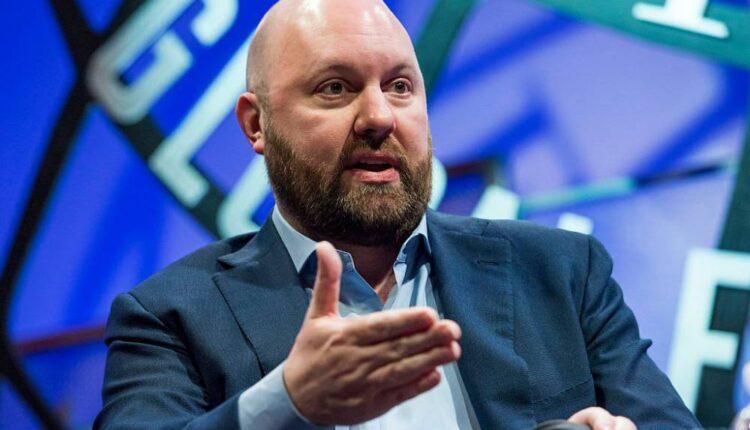
- Venture capitalist Marc Andreessen wrote an essay over the weekend decrying the West's horrific lack of preparation and disorganized response to the coronavirus pandemic.
- His solution: We need to rekindle the desire to build things in this country. We have the money, we have the know-how, but we lack the desire.
- This op-ed by CNBC.com Tech editor Matt Rosoff attempts to offer some possible reasons why.
Marc Andreessen, co-founder and general partner of Andreessen HorowitzDavid Paul Morris | Bloomberg | Getty Images
Venture capitalist Marc Andreessen wrote an essay over the weekend decrying the West's horrific lack of preparation and disorganized response to the coronavirus pandemic.
He notes that the U.S. couldn't even ramp up production of masks to protect our health-care workers, and he contrasts this unfavorably with an America of past eras that built skyscrapers and interstates and microchips.
His solution: We need to rekindle the desire to build things in this country. We have the money, we have the know-how, but we lack the desire.
Andreessen has relevant experience here — before he became an investor, he invented one the first web browsers, which allowed millions of people to take advantage of the internet for the first time and paved the way for the dot-com revolution and everything after.
His conclusion is hard to disagree with and has inspired a lot of vigorous virtual head-nodding on VC Twitter and other corners of the internet.
Andreessen and I are part of the same generation — Gen X, the dot-com generation, the generation that briefly hoped the internet would provide us an escape from the social and political structures that the larger and more politically powerful baby boomers had established in the 1970s and '80s.
It didn't work out that way, and like him, I've spent a lot of time contemplating where and how things went wrong.
Andreessen touches on some of the contributing factors in his essay, writing that the right — the traditional pro-capitalist wing of American society — "must fight hard against crony capitalism, regulatory capture, ossified oligopolies, risk-inducing offshoring, investor-friendly buybacks in lieu of customer-friendly (and, over a longer period of time, even more investor-friendly) innovation."
But there's more to the picture. I don't have a simple clear diagnosis, but here are some things to think about:
Personal incentives don't reward builders. In the early 1980s, the "Greed is Good" philosophy espoused in the movie "Wall Street" made sense on a macro level. American corporations had gotten inefficient and bloated and were being outperformed by more agile Japanese conglomerates, the economy struggled with a malaise of high inflation and stagnant growth, and the culture idolized hedonism and rebellion. The corrective measures included dramatically lower taxes and new incentives to restructure companies for more efficiency, along with a more gung-ho "Morning in America" culture.
But on a micro level, financial incentives shifted away from builders. Low personal tax rates and high business taxes encourage hoarding and discourage reinvesting or starting new businesses. For the last four decades, the biggest paydays have been in professions that involve the allocation and shifting of capital, rather than building things. (Tech is the one narrow exception.)
Shareholder culture doesn't reward building. As Andreessen notes, one by-product of the "Greed is Good" ethos is a corporate governance philosophy that rewards shareholders over all other stakeholders in a business. Executives are compensated with stock incentives, giving them little reason to focus on anything else. Employee well-being, customer satisfaction, "externalities" like clean air and water and minimal carbon output are only important insofar as they help or hurt the company's stock price. Cash is used to repurchase shares to boost earnings per share, instead of investing in new business areas. Expensive domestic workers and factories are replaced with cheaper off-shore labor. And if a company loses sight of its shareholders, it's subject to hostile takeovers from corporate raiders with no emotional commitment to the business, willing to make whatever brutal decisions are necessary to squeeze out any remaining efficiencies.
Paradoxically, this leads to wildly inefficient capital allocation among successful businesses — look at the massive cash hoards the biggest tech companies keep on hand rather than reinvesting them into innovation or new business lines.
We prefer comfort and convenience. In one sense, Andreessen is wrong — Americans have built plenty of new businesses in recent decades. Think about all the selections of craft beer we now have at the grocery store compared with the 1980s, when our choices were basically Bud and Miller. Or the thousands of TV channels and near infinite smorgasbord of streaming content compared with the six TV channels I had as a kid. Or the venture-funded money-losing start-ups coming out of Silicon Valley in the last 10 years, which have focused on personal comforts for people with money, like "drive me around" and "bring me a meal so I don't have to cook" and "find me a cool apartment in Barcelona for a week so I don't have to pay for a hotel." Americans tell businesses what they want by where they spend their money, and we clearly want comfort and convenience. Long-term solutions to complicated problems that require heavy up-front investment and risk and may not work? Not so much.
Regulations and regulatory capture get in the way. Regulation is often held up as a bogeyman in Silicon Valley, and Andreessen follows suit in his essay. He's right, and the evidence is hard to ignore.
As Andreessen's fellow venture capitalist Keith Rabois has pointed out, most industries with relaxed regulations have seen a constant march toward more choice and lower price — you can certainly see it in computer hardware, for instance. But the industries where governments are most involved — health care, education and real estate — have seen dramatic price increases and constrained supply. Businesses that benefit most from these regulations naturally use every tool at their disposal to keep them in place, from lobbying to public opinion campaigns.
Nowhere is this clearer than in San Francisco, where a thicket of regulations makes it time-consuming and costly to build new housing, even as the city struggles from a highly visible and seemingly unsolvable homeless problem. Any attempt at reform is blocked by a coalition of long-time residents and homeowners who want to preserve their property values and the character of the community, and a so-called progressive wing that won't tolerate any solution that does not include government-mandated price controls on some arbitrary percentage of housing.
Multiply this situation by a thousandfold at every level of government, in countless industries across the country.
Public service is optional. The end of the military draft in the 1970s was driven by a sense of justice. It was not fair that kids were forced to fight and die in wars that broad sections of the population thought were unjust, like Vietnam.
But instead of replacing it with some other kind of public service, we abandoned the idea of mandatory public service entirely. Since the end of conscription, there's been no institution of American life that forces people from all walks of life — urban and rural, rich and poor, every race — to come together and work as a team toward a common goal. It's harder to accept the sacrifices necessary to envision and build big solutions to broad social problems if you view huge parts of society as "the other people." Not my problem!
Millennialism. There's a feature of American culture that runs parallel to greed and short-term thinking but is more subtle and less frequently called out. That's millennialism, the idea that society is unfixable and hurtling toward a bitter and violent end, so rather than building, the best course of action is to hoard and plan for survival.
We saw this at the turn of the millennium with the ungrounded panic over the Y2K computer bug. We see it in heightened gun sales every time there's a natural disaster — why is the instinct to arm against struggling people we see as potential looters, instead of to figure out how to help struggling people we see as fellow citizens and neighbors?
We see it in the wealthiest buying up huge tracts of land in rural America and New Zealand and quietly asking futurists for advice on how to escape. We see it in the prominence of dystopian science fiction in popular culture. We see it even in the normally utopian tech world — Andreessen's venture firm has been one of the biggest proponents of cryptocurrency, which at its heart is a bet on the instability and eventual collapse of central governments and fiat currency.
Leadership. We all keep waiting for somebody else to come up with the solution. Politics is hopeless — whatever one party suggests, the other party will fight on principle just because they didn't think of it, and because division is helpful to rile up the base and raise more funds for the next election. Business leaders face strong personal and corporate incentives to pursue short-term gain and avoid risk, as Andreessen notes.
The rest of us are preoccupied with paying our medical bills and our children's college tuition and our housing costs, or — if we're lucky — choosing which beer to drink or show to watch this evening.
Leadership doesn't have to come from the top. Most great movements were started by normal people who were fed up with the way things were and determined to convince others to join them in building something new.
So yes, we need more builders. Now the question is: What are you — not just Marc Andreessen, but you, the person reading this — going to do about it?
VIDEO7:5007:50Why this expert is skeptical of businesses changing practices without regulationSquawk on the Street
Source: cnbc.com

